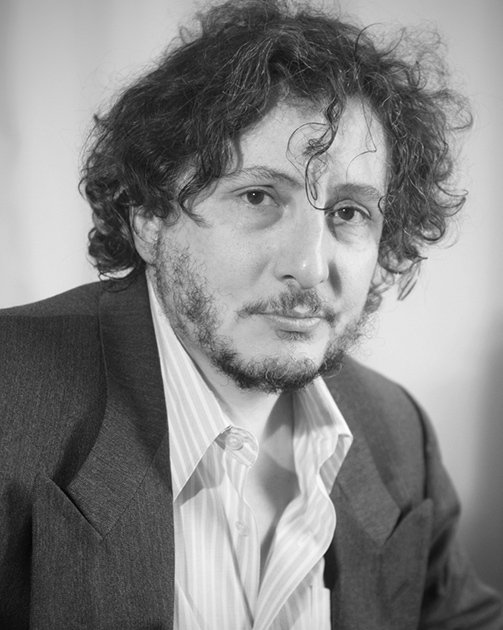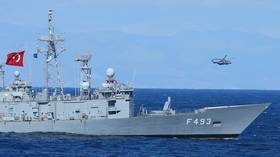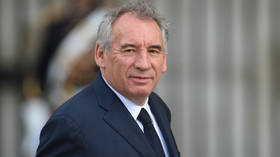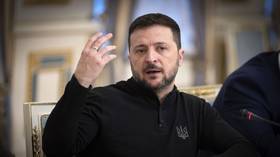US foreign policy elite wants Biden & detests Trump because President failed to launch new NATO missions to justify its existence
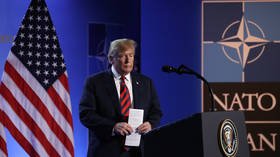
One reason for the extraordinary hostility of the foreign policy insiders’ brigade toward President Trump is that he has not wasted his time conjuring up new missions to justify NATO’s continued existence.
Instead, he has promised to withdraw 12,000 US troops from Germany and, to add insult to injury, he has demanded that NATO member states increase their financial contributions toward the upkeep of the military alliance ostensibly there to “protect” them.
This is sacrilege to a foreign policy elite that have spent the last 70 years worshipping at the altar of NATO.
“US troops aren’t stationed around the world as traffic cops or welfare caseworkers—they’re restraining the expansionary aims of the world's worst regimes, chiefly China and Russia,” Sen. Ben Sasse, R-Neb., fumed.
Former National Security Adviser Susan Rice expressed alarm about the “continued erosion of confidence in our leadership within NATO, and more efforts that call into question our commitment, and more signals to the authoritarians within NATO and Russia itself that this whole institution is vulnerable.”
Trump, according to Nicholas Burns, former US ambassador to NATO and current adviser to Joe Biden, has cast America’s military allies primarily as a drain on the US Treasury, and he has aggressively criticized Washington’s true friends in Europe—democratic leaders such as France’s President Emmanuel Macron and Germany’s Chancellor, Angela Merkel—even as he treats Vladimir Putin, Xi Jinping, Kim Jong Un, and other ‘authoritarians’ around the world with unusual tact.
Seventy former Republican national security officials recently issued a statement accusing Trump of having “disgraced America’s global reputation and undermined our nation’s moral and diplomatic influence.” And—horror of horrors!—Trump “has called NATO ‘obsolete.’ ”
“Trump has disgraced America’s global reputation and undermined our nation’s moral and diplomatic influence” - Former Republican National Security Officials for Biden https://t.co/MafvO2AOXK
— Noah Barkin (@noahbarkin) August 20, 2020
Not only has Trump failed to spell out a new mission for NATO, the one mission of sorts he has come up with—extraction of more funds from NATO member-states—is calculated to cause mutual recriminations within the alliance. Trump regularly boasts that he has cajoled NATO to cough up an additional $130 billion a year “and it’s going to be $400 billion,” he recently warned.
To the denizens of Washington’s foreign policy think-tanks, pressuring NATO member states to come up with more money is a dangerous business. It could have the undesirable effect of forcing them to wonder whether devoting scarce resources to NATO—particularly now following the Covid economic downturn—is a sound investment.
Also on rt.com Caitlin Johnstone: The modern US war machine kills more like a python than a tigerNATO desperate to find reasons to justify its existence
It is no secret that ever since the fall of the Soviet Union and the dissolution of the Warsaw Pact, NATO has been desperately searching for a reason to justify its existence. The alliance has expanded its membership from 16 to 30 in 20 years, while failing to put forward a convincing reason, other than inertia, for staying in business.
To be sure, there were and are threats—cybersecurity, mass migration, human trafficking, narcotics, nuclear proliferation, international terrorism—but it was never clear how a narrowly-focused military alliance would be able to address them unilaterally. NATO has thus been forced to engage in some vigorous head-scratching.
During the 1990s, we had the “humanitarian intervention” craze. This led to the NATO bombing of Bosnia-Herzegovina in 1994 and 1995 and, more horrifically, to the bombing of Yugoslavia in 1999. Neither operation achieved anything that could not have been achieved years earlier—and without the use of force.
In 2001, NATO got in on the Global War on Terror. After 9/11 NATO, for the first time in its history, invoked Article 5 of the North Atlantic Treaty, declaring that the terrorist attack on the US was an attack against every NATO member.
When the United States retaliated by invading Afghanistan in October 2001, NATO was on hand to assist. In December, it established something called the International Security Assistance Force, the nebulous mission of which was to “assist the Afghan Government in exercising and extending its authority and influence across the country, paving the way for reconstruction and effective governance.”
Next came Iraq. Despite the vocal opposition of France and Germany to the 2003 invasion, NATO, in no time got involved. In 2004, it established NATO Training Mission-Iraq, the aim of which was supposedly to “assist in the development of Iraqi security forces training structures and institutions so that Iraq can build an effective and sustainable capability that addresses the needs of the nation.” One of its tasks was to train the Iraqi police. However, as WikiLeaks’ Iraq War Logs disclosure revealed, Iraq’s finely-trained police conducted horrific torture on detainees. Neither NATO’s Afghanistan nor its Iraqi mission covered itself in glory.
With the Democrats returning to power in Washington in 2009, NATO was back in the “humanitarian intervention” business. Its bombing of Libya in 2011 destroyed government, law and public order, institutions that before the intervention had ensured that the people of Libya were able to go about their daily lives free from the fear of death, not to mention the spectacle of slave markets.
The “humanitarian intervention” in Libya having ended in debacle and war crimes (including the execution of Muammar Gaddafi) in which NATO was clearly involved, it was back to the old Cold War mission of “containment.”
Following the February 21, 2014, coup in Kiev and the reincorporation of Crimea into Russia, NATO’s new mission was very much like its old. NATO Secretary General Anders Fogh Rasmussen promised that: “We will have more planes in the air, more ships on the water, and more readiness on the land. For example, air policing aircraft will fly more sorties over the Baltic region. Allied ships will deploy to the Baltic Sea, the Eastern Mediterranean and elsewhere.”
Six years on, it’s clear that there simply aren’t enough armed conflicts in the world to justify the continued existence, not to mention huge expense, of such a gargantuan military organization. NATO has therefore resorted to seizing on the latest fashionable social and cultural issues to prove how up-to-date it is.
Also on rt.com NATO’s appalling failure in Afghanistan has fuelled a drug explosion across EuropeMore NATO as solution to Climate change?
For example, NATO has added “climate change” to its repertoire. NATO’s 2010 Strategic Concept declared that “Key environmental and resource constraints, including health risks, climate change, water scarcity and increasing energy needs will further shape the future security environment in areas of concern to NATO and have the potential to significantly affect NATO planning and operations.”
One would have thought that the most effective way NATO could contribute to minimizing global warming would be to cut back on armaments, military exercises and naval and air patrols. But no, apparently the solution to “climate change” is more NATO, not less.
Then came the issue gender equality. “Achieving gender equality is our collective task. And NATO is doing its part,” said Mari Skåre, the NATO Secretary General’s Special Representative for Women, Peace and Security, in 2013. In March 2016, on International Women’s Day, NATO held a so-called “Barbershop Conference” on gender equality. Secretary-General Jens Stoltenberg took the opportunity to declare that gender equality was a frightfully important issue for the alliance because “NATO is a values-based organization and none of its fundamental values—individual liberties, democracy, human rights and the rule of law—work without equality….We learned in Afghanistan and in the Balkans that by integrating gender within our operations, we make a tangible difference to the lives of women and children”.
Definitely a “tangible difference to the lives of women and children”: As a result of NATO’s bombing campaigns in Yugoslavia and Libya, thousands of women and children lost their lives. In Libya, for example, NATO helped deliver perhaps thousands of women into the hands of ISIS.
This is how Human Rights Watch in 2017 described the record of ISIS rule in Libya:
“In the first half of 2016, fighters loyal to ISIS controlled the central coastal town of Sirte and subjected residents to a rigid interpretation of Sharia law that included public floggings, amputation of limbs, and public lynchings, often leaving the victims’ corpses on display.”
Trump’s failure to articulate a new mission for NATO, combined with his desire to extract more and more funds from the 29 member nations, puts the military alliance in a very vulnerable position. With no new mission and no obvious threats to Europe on the horizon—or at least none that NATO seems capable of addressing—its member states, sooner or later, are bound to question the value of belonging to an organization, with such high membership fees and so few benefits. No wonder the foreign-policy cognoscenti are fulminating and praying for a Biden presidency.
One of the reasons the foreign policy crowd detests Trump is that he hasn't wasted his time trying to invent some "new mission" for NATO. Where Trump differs from his predecessors is that he hasn't bothered trying to invent some new reason for NATO's continued existence: Clinton had Yugoslavia, Bush Afghanistan & Iraq, Obama Libya. Trump hasn't identified any "new mission" for NATO. Maybe because there isn't one.
Think your friends would be interested? Share this story!
The statements, views and opinions expressed in this column are solely those of the author and do not necessarily represent those of RT.
